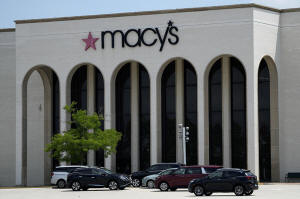Macy's surprises in first quarter, but cuts profit outlook as tariff
costs seep in
[May 29, 2025] By
ANNE D'INNOCENZIO and MICHELLE CHAPMAN
NEW YORK (AP) — Macy’s sales and profit slipped in its first quarter and
the department store, citing more cautious customers and the impact that
a trade war launched by the U.S., trimmed its profit forecast for 2025.
The New York retailer, however, topped most performance expectations for
the first three months of the year and maintained its annual sales
forecast.
Yet Macy’s CEO Tony Spring said that after seeing almost no price
increases linked to tariffs in the first quarter, some “limited” price
increases are appearing now, leading to the more cautious annual profit
outlook.
“I think it’s important to understand that we are not just broadly
increasing price,” Spring said in a conference call Wednesday. “We’re
being incredibly surgical about the situation with tariffs.”
The company is diversifying the origin of its products as well, and will
pull items when the math doesn’t work, he said.
About 20% of Macy’s products came from China at the end of its last
fiscal year. Private brands sourced approximately 27% from China, down
from 32% last year.
“With the recent announcement of these tariffs, we’ve renegotiated
orders with suppliers,” Spring said. “We’ve canceled or delayed orders
where the value proposition is just not where it needs to be.”

Shares rose 1% Wednesday.
Sales at Macy’s, which also owns upscale Bloomingdale’s and the
Bluemercury cosmetics chain, dropped to $4.79 billion, from $5 billion a
year earlier. That’s better than the $4.42 billion that analysts polled
by FactSet expected.
Comparable sales, which include those online, dipped 2%. There was
comparable store sales growth at Bloomingdale’s and Bluemercury.
Neil Saunders, managing director of GlobalData, said it wasn’t a bad
quarter for Macy’s, particularly as the retailer closes underperforming
locations.
Macy’s said previously that it would close 66 stores, mostly in the
first quarter.
“The 2.0% dip in comparable sales is below market growth but is not
entirely unexpected,” Saunders wrote. “It is also, barring the robust
holiday quarter, a somewhat better performance than Macy’s delivered
across most of the last fiscal year.”
For the period ended May 3, Macy’s earned $38 million, or 13 cents per
share. That compares with $62 million, or 22 cents per share, a year
ago.
Stripping out one time charges, earnings were 16 cents per share, which
topped Wall Street’s estimate by a penny.

[to top of second column] |

Cars are parked in front of a Macy's store at Hawthorn Mall in
Vernon Hills, Ill., June 3, 2024.(AP Photo/Nam Y. Huh, file)
 The company stuck by its 2025 sales
forecast which ranged from $21 billion to $21.4 billion. But it now
expects full-year adjusted earnings between $1.60 and $2 per share.
Its prior forecast was for an adjusted profit of $2.05 to $2.25 per
share.
Industry analysts had been projecting full-year sales of $21.03
billion and an adjusted per-share profit of $1.91.
Macy’s and other retailers are wrestling with uncertainty about
tariffs which are making it difficult to plan. The same goes for
many American consumers who have are growing increasingly
uncomfortable about the U.S. economy and watching their spending.
American Eagle Outfitters withdrew its annual financial outlook
earlier this month citing “macro uncertainty” and said it would
write down $75 million in spring and summer merchandise.
Ross Stores withdrew its forecast last week.
Walmart, the nation’s largest retailer, got a public scolding from
President Donald Trump this month after it said that it has already
raised prices on some items and would have to do so again this
summer. Trump told the retail giant that it should “eat” the
additional costs.
Target’s sales fell more than expected in the first quarter and it
warned they will continue to flag this year.
Home Depot, too, said that it will eat some of the costs but that
some goods heavily impacted by the trade war will no longer be on
shelves.
Trump’s threatened 145% import taxes on Chinese goods were reduced
to 30% in a deal announced May 12, with some of the higher tariffs
on pause for 90 days. Trump on Friday threatened a 50% tax on all
imports from the European Union as well as a 25% tariff on
smartphones unless they’re made in America.

On Sunday, however, Trump said that the U.S. will delay
implementation of a 50% tariff on goods from the EU until July 9 to
negotiate.
Spring, Macy’s CEO, said there has been some success with vendors on
lowering prices, but the department store is absorbing some costs as
well.
“We’re making selective price increase in selective brands,
selective categories, because we believe the value equation for the
customer is still very relevant,” Spring said. “So some of the
impact on our gross margin this year is going to be around the
tariffs, but we’re also investing in getting market share because we
really do believe as we get into the back half of the year, that
price value dimension is going to be very critical.”
All contents © copyright 2025 Associated Press. All rights reserved |